 |
A monthly publication of the United States Committee for a Free Lebanon |
 |
A monthly publication of the United States Committee for a Free Lebanon |
| Vol. 1 No. 4 | April 1999 |
|
Lebanon Report Middle East Report Intelligence Briefs |
|
MEIB Main Page Executive Director Ziad K. Abdelnour Editor Gary C. Gambill Advisory Board Rachel Ehrenfeld Gil Feiler Murray Kahl Daniel Nassif Daniel Pipes Gary P. Ratner David P. Steinman |
 |
| Jumblatt: "We will defend ourselves" |
Pro-Syrian Druze militia leader Walid Jumblatt said earlier this month that his forces were on the verge of "civil revolt" and called on his supporters to prepare for an assault by security forces against his stronghold in the Shouf mountains. Such threatening statements by Jumblatt, whose Progressive Socialist Party (PSP) militia strived to "cleanse" the Shouf region of Christian inhabitants during the Lebanese civil war, have generated an atmosphere of sectarian strife in Lebanon.
Jumblatt's threats came amid growing tensions between the Druze warlord and the new government of Lebanese President Emile Lahoud. The primary issue of contention is the ongoing government probe into alleged embezzlement by the National Fund for the Displaced, which Jumblatt headed during the tenure of former Lebanese Prime Minister Rafiq al-Hariri. Adding to his discomfort is President Lahoud's aversion to direct talks with Jumblatt. Sources close to Jumblatt said that he has been waiting for three weeks to be given an appointment with the president
Jumblatt has also criticized the security forces for failing to apprehend any suspects involved in an alleged theft at his offices in Mukhtara and threatened that his militia would punish the criminals. "We waited in vain for the result of investigation led by the security services into the theft . . . but our own private investigation allowed me to discover who the thieves are. We'll apply PSP justice."
Speaking to a delegation of Druze notables in Mukhtara on April 4, Jumblatt said that he was "living today in an atmosphere of siege set up by the national mandate" against himself and Hariri. He called for resistance against possible action by Lebanese security forces. "You're under siege and we're getting ready for a possible assault against Mukhtara under the national mandate," he said. Jumblatt departed the next day to Damascus for consultations with Syrian officials.
Meanwhile, Lebanon's National News Agency said that the era in which Jumblatt ruled the Shouf by decree is "gone for good" and that Jumblatt will "find out he is not beyond justice" if he tries to reestablish this authority.
The United States Committee for a Free Lebanon (USCFL) and the Middle East Forum (MEF) held their second Lebanon Study Group session on March 18, in preparation for the publication of a detailed report on U.S. policy toward Lebanon later this year. The meeting, held at the Rayburn House Office Building in Washington DC, focused on Syria's role in Lebanon.
|
Ziad Abdelnour, President of the United States Committee for a Free Lebanon. Elliott Abrams Former Assistant Secretary of State for Latin American affairs, now President of the Ethics & Public Policy Center. Graeme Bannerman, Founder and President of Bannerman & Associates, Inc. Former staff director for the Senate Foreign Relations Committee. Deborah Bodlander, representing Benjamin Gilman (R-NY); the Chairman of the House International Relations Committee. Paula Dobriansky: Senior international affairs and trade advisor at the law firm of Hunton & Williams; Former director of European and soviet affairs at the National Security Council. Michael Eisenstat, Senior fellow at the Washington Institute for Near East Policy; Specialist on Arab-Israeli and Persian Gulf security affairs. Douglas Feith, Founding member of the law firm Feith and Zell, P.C.; Former deputy assistant secretary of defense for negotiations policy. Frank Gaffney, Director of the Center for Security Policy; Former Deputy Assistant Secretary of Defense for Nuclear Forces and Arms Control Policy. Daniel Guido, Richard Hellman, Founder and President of CIPAC, the Christians' Israel Public Action Campaign; Former Counsel to the U.S Senate. Paul Jureidini, A partner with Jureidini and McLaurin, a Virginia based law firm specializing in corporate law. Habib Malik, Visiting fellow at the Washington Institute for Near East Policy, 1995; Founding member of the Foundation for Human and Humanitarian Rights. Daniel Nassif, Current Executive Director of the American Lebanese Institute. Daniel Pipes, Editor of Middle East Quarterly and adjunct scholar at the Washington Institute. Among his many published works is Syria Beyond the Peace Process. Roger Robinson |
Transformation of the Lebanese Army
Paul Jureidini gave a presentation on the transformation of the Lebanese Army under Syrian hegemony. "The Lebanese Army is becoming an adjunct of the Syrian army," said Jureidini. Wheras large numbers of Lebanese army officers received training in Western countries in the past, the number of officers being trained in Syria has steadily grown. An estimated 50% of officers currently serving in the army have attended a Syrian military academy.
The promotion of pro-Syrian officers over those who observe the Lebanese Army's long-standing apolitical tradition has seriously altered the military command structure, according to Jureidini. This trend was most evident in the appointment of General Michel Suleiman as Commander-in-Chief of the Lebanese Army. Suleiman, who has very close Syrian connections, was chosen despite the fact that 84 other officers were higher than him in rank and seniority.
Moreover, the predominantly Alawite Syrian regime, long distrustful of both its own majority Sunni population and Lebanon's Christians, has discouraged recruitment of Sunnis and Christians into the military. By Jureidini's estimate, Lebanese Shiites comprise 60% of the army and 30% owe "some form of allegiance to Hezbollah."
Ideological, Economic, and Strategic Motivations for the Occupation
Participants then discussed in detail the ideological, economic, and strategic motivations behind Syria's occupation of Lebanon. Most agreed that the Syrian regime's ideological commitment to control of "Greater Syria"--a region encompassing most of present-day Syria, Lebanon, Israel, the West Bank, and Jordan--is the paramount factor.
According to MEF director Daniel Pipes, the survival of the Syrian regime is ultimately dependent upon the domestic political "legitimacy" accruing from this ideological commitment. While Syria participates in the peace process in order to "escape the opprobium of being a rogue state," it is unlikely that Syria will relinquish its commitment to "Greater Syria" by extending diplomatic recognition to either Lebanon or Israel in the future.
The integral content of this discussion and those of other Lebanon Study Group meetings will be compiled into a print publication later this year which will be distributed to U.S. government officials, congressional representatives, foreign embassies, media outlets, and academic institutions. The third and final meeting of the Lebanon Study Group will take place on May 5.
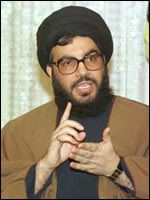 |
| Sheikh Hassan Nasrallah |
Hizbollah, the Iranian-backed Lebanese Shi'ite guerilla movement fighting Israeli forces in south Lebanon, is reportedly adopting an aggressive new policy targeting the United States as the "real enemy" of Lebanon and the Middle East.
"The American administration is our real enemy because it is the one that began the aggression against people in the (Middle East) region," said Hizbollah spiritual leader Sheikh Hassan Nasrallah in an interview last month with the Arabic weekly al-Wasat. "The successive American administrations were responsible every time a drop of blood was spilled in southern Lebanon, a house was destroyed there or a tree burnt" by Israeli troops." Thus, he said, "The Israeli soldier is our direct enemy, but the money and political cover are ensured by the United States who have pledged to maintain Israeli supremacy over all the countries of the region."
Nasrallah's warning came shortly after a crowd of 200 Hizbollah partisans chanting anti-American slogans surrounded the motorcade of U.S. ambassador to Lebanon David Satterfield on March 14 . Satterfield's bodyguard's were forced to cock their weapons in order to ward off the protestors. The convoy, enroute to Hermel in the northern Bekaa valley, turned back due to "security concerns."
USCFL analysts closely monitor disclosures of rampant corruption during the regime of former prime minister Rafiq Hariri and maintain detailed files on most of the government officials whose criminal misconduct has bankrupted the country. The following report summarizes the allegations against former government ministers whose egregious violations of the law have recently made headlines in Lebanon.
Earlier this month, former prime minister Rafiq Hariri and three former cabinet ministers were implicated in a 157-page report (which has not yet been made public) prepared by the Court of Accounts and presented at the end of last month to the Cabinet. The Court of Accounts report alleges that Hariri, former information minister Bassem Sabaa, former minister of state for financial affairs Fouad Siniora, * diverted $750 million from the Independent Municipal Fund in 1998 for illicit development projects and other uses. The Fund is drawn from municipal taxes and the only legal uses of this money are its redistribution to the various municipalities or its expenditure on approved projects for their benefit.1
The former minister are also accused of "forging" budget deficit figures by retaining municipal funds in the Treasury to help decrease the public debt.
The report, which has not yet been made public, was discussed at the March 31 Cabinet meeting and shortly thereafter was referred to the State Prosecutor General.2 State Prosecutor Adnan Addoum, who was assigned by the cabinet to examine the report, has refused to comment on the case before completing his examination. Sources say that prosecution of the four ministers is likely and that it will not take place in the Higher Council for the trial of presidents and ministers, attached to Parliament, but through regular criminal courts.
According to Lebanese sources, one of the principle recipients of the embezzled funds was the Sukleen company, which is in charge of waste collection and disposal in the Greater Beirut area and several sectors of Mount Lebanon.
Hariri is also under investigation for the alleged theft of a dozen truckloads of furniture from the Grand Serail at the end of his tenure as prime minister. departure.
Former minister Bassem Sabaa is reportedly blamed for concluding agreements to spend over $11 million of funds that had not been appropriated. Sabaa told reporters, however, that "certain parties" provided false information to the Auditing Department and that the conclusions of the report were wrong. Sabaa also said that the contract granted to Sukleen was approved by cabinet, adding that the Auditing Department did not question any former government officials before making the accusations.
Fouad Siniora has been the target of several other investigations.
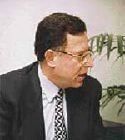 |
| Fouad Siniora |
The Central Fund for the Displaced, headed by former minister Walid Jumblat, is also said to be the target of investigation. Sources also say that an investigation into "suspicious operations and unlawful deals" at the Environment Ministry is likely and will lead to the prosecution of at least one of the three former ministers who held this portfolio under the Hariri regime. In addition, the Cabinet has instructed the Auditing Department to look into suspicious deals at the Council for Development and Reconstruction, the Council for Executing Construction Projects, the Council for Executing Large Projects in Beirut, the Council of the South, the Investment Development Authority for Lebanon and the Ogero telecommunications company.
It should be noted that while these investigations are being pushed forward by the new regime of Prime Minister Selim al-Hoss and president Emile Lahoud, there is no reason to believe that members of the current government are not guilty of similar infractions. Regime transitions in Lebanon often follow a pattern whereby newly-installed government leaders attempt to bolster their credibility by investigating and exposing the crimes of their predecessors only to follow in their footsteps.
1 The Cabinet also instructed the Court of Accounts to investigate suspicious deals at the Council for Development and Reconstruction, the Council for Executing Construction Projects, the Council for Executing Large Projects in Beirut, the Council of the South, the Central Fund for the Displaced, the Investment Development Authority for Lebanon and OGERO, a government telecommunications agency.New evidence has come to light recently that Iraq has sucessfully preserved integral components of its extensive nuclear-weapons program, which will presumabley be reactivated now that U.N. inspections have come to a halt.
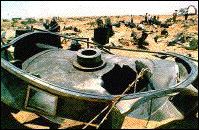 |
| A calutron destroyed by UNSCOM and IAEA inspectors after the Gulf War |
Several research, development, and prodcution facilities are known to still exist throughout the country. U.N. weapons inspectors who visited the Al-Ubur industrial complex west of Baghdad last year said that the factory was equipped with a high capacity power generator and a water-purification plant--both of which are needed for the operation of calutrons--particle accelerators used to enrich uranium. "We are worried [about] what the Iraqis can do in this facility in the future," said a former U.N. weapons inspector.
New evidence indicates that a project to build a nuclear reactor for producing weapons-grade plutonium was well underway at the time of the 1991 Gulf War, but went undiscovered.
According to officals of the London-based Iraqi National Congress (INC), an Iraqi nuclear technician defected to northern Iraq in early 1994 and provided the CIA with a large number of documents, including hand-drawn diagrams for a nuclear reactor Iraq was planning to build and detailed reports on manufacturing facilities where secret nuclear weapons research had been taking place for over a decade.
The CIA did not pass this information on to the International Atomic Energy Agency (IAEA) or UNSCOM, however. Kenneth R. Timmerman, a Contributing Editor of Reader's Digest, said in a recent article that he obtained a copy of these documents from INC officials and showed them to IAEA and U.N. officials. "Items they were familiar with, such as details of Iraq's little-known laser uranium-enrichment program, and the names of scientists working at various nuclear establishments, added to the credibility of the defector's information," said Timmerman.
The defector's report said that Iraq had manufactured 200 uranium fuel bundles prior to the 1991 Gulf War and successfully hid them from U.N. inspectors. The uranium bundles, which can be used to fuel a nuclear reaction and generate weapons-grade plutonium, were never discovered by IAEA and U.N. inspectors, though some evidence of their existence had been previously obtained.
The information provided by the defector also indicates how Iraq was able to prevent detection of its nuclear reactor by sophisticated environmental sampling equipment used by the IAEA by dismantling the reactor and transporting its components to secret locations throughout the country.
Iraq still maintains significant nuclear production capabilities and can easily resume its efforts to develop nuclear weapons now that the U.N. inspection program has ended. "The threat is in the present and the future," said former IAEA inspector David Kay in a recent interview.
Iraq's production and storage facilities are apparently not being targeted for destruction by the U.S. airforce. According to intelligence sources, the U.S. Joint Chiefs removed several of these facilities from the target list during the December 1998 Desert Fox bombing campaign due to fears that nuclear and/or biological agents could be released into the atmosphere.
The Iranian-Albanian Axis
MEIB anlaysts have received reports that European defense and diplomatic officials are quietly expressing concern over Iranian involvement in the Kosovo uprising. "Europe is beginning to realize that Kosovo is not just about a rebellion. It's about a growing Iranian attempt to support and dominate movements in states in Europe," said one senior European defense official. An independent Kosovo aligned with Teheran, it is feared, would become the lynchpin for an Iranian sphere of influence that spans from Albania in the east to Bosnia in the west. These concerns have led to the refusal of Greece, which has an Albanian minority,to take part in any NATO operations in Yugoslavia. The possible extension of Iranian influence into the heart of Western Europe is of concern to both Britain, which has a 1.5 million-strong Muslim minority, and France, which is home to two million Muslims. In both countries, Muslims are relatively poor and alienated from mainstream society.
Iranian influence in the Balkans began during the Yugoslav civil war, when thousands of pro-Iranian guerillas came in from Afghanistan to fight alongside Bosnian Muslim forces. Most of them were allowed to stay in the country after the end of the conflict and Iran has since provided tens of millions of dollars annually to the Bosnian government. During the mid-1990's, Iranian agents extended their activities to Albania.
Albania is now the center of Iranian intelligence in Europe. The primary objectives of this involvement in Albania were laid out by the Iranian leadership early last year:Albania emerged from the end of the Cold War as Europe's poorest country. The collapse of communism and exposure to the Western media resulted in rapidly rising expectations of attaining a Western standard of living. The dismal performance of Albania's economy, which dashed these expectations, and the relaxation of economic controls combined to generate (as in Russia) a tremendous upsurge of organized crime. Due to the rapid growth of these predominantly Albanian and Italian mafias, Albania became a major international conduit for the flow of weapons, drugs, counterfeit money controlled by organized crime. These factors generated an acute backlash in Albania's relatively backword, rural society as droves of Albanians sought salvation from this state of chaos and poverty through Islam. This socio-economic milieu was ripe for Iranian penetration.
The mid-1990's witnessed the emergence of a comprehensive financial network of Iranian economic, humanitarian, and religious institutions which brought a steady stream of foreign currency into the impoverishedcountry. By early 1997, Iran had become by far the most dominant external player in the Albanian economy. This not only ingratiated the Iranians to the local populace, but facillitated the conversion of Albania's predominantly Muslim, though secular, population to a more militant brand of Islam.
Beneath the surface of this socio-economic network, however, lurked a clandestine Iranian intelligence network allowed to operate freely by the Albanian government. In remote regions of Albania, Tehran established a number of secret training camps for mujahidin, or Islamic freedom fighters. Though predominantly Albanian, the mujahidin include thousands of recruits from Bosnia, Egypt, Macedonia, and other Islamic countries. Many previously served in Afghanistan and other regional conflict areas. Iranian intelligence stockpiled massive amounts of weapons in these camps.
Iran welcomed the emergence in early 1997 of the Kosovo Liberation Army (KLA) in the neighboring Yugoslav republic of Serbia. In the fall of 1997, Iran launched a major program for shipping weapons and military supplies to the Kosovo Liberation Army (KLA). By early December 1997, shipments of machine guns, hand grenades, night vision equipment, and communications gear has arrived into Kosovo from Iranian stockpiles in Albania. The Iranian Revolutionary Guards also began providing training for now provide weapons and training to KLA guerillas at secret facilities in Bosnia and Albania.1 The frequency and severity of armed attacks by the KLA rapidly grew throughout 1998 due Iranian support.
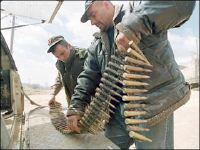 |
| Two KLA fighters assemble rounds of ammunition earlier this month. |
While leaders of the KLA insist that only Albanians are allowed into their ranks, the inclusion of mujahidin from around the Islamic world is well-known. "I interviewed one guy from Saudi Arabia who said that it was his eighth jihad," reported a Dutch journalist last year.2
Meanwhile, Saudi Arabia has reportedly been sending financial assistance to the KLA as well (it is not clear whether the Iranians and Saudis are coordinating their efforts). In addition, ties between the KLA and several radical Islamic groups in the Middle East have have been reported. Saudi expatriate Osama Bin Laden, for example, is known to have an active terrorist cell in Tropoje, Albania, a known KLA staging area.
Although Western European officials have privately expressed reservations about the Kosovo crisis, few have been overtly critical of the ongoing NATO airstrikes. "The gap between the public political rhetoric and the private professional discussions is huge," said one European defense official.
Although America's special envoy to Bosnia, Robert Gelbard, said last year that the KLA is "without any questions, a terrorist group" (a view shared my most Western observers at the time), U.S. officials have suddenly adopted a policy of conspicuous silence with regard to Iranian involvement with the KLA, though the issue continues to be raised in Congress. "At this point, however, nobody is really listening," said one congressional analyst. "The Belgrade government and Milosevic, in particular, has been so clumsy in dealing with Kosovo that all the real issues have been lost. Everybody is talking about Milosevic as the evil man of Europe as if his removal solves everything."
U.S. officials are now said to be in regular contact via satellite phone with KLA leader Hashim Thaci, who has repeatedly requested wire-guided anti-tank missiles and mortars to destroy Yugoslav tanks that have easily evaded the air campaign thus far. Although no such plans are officially underway, a number of State Department officials are said to be lobbying the White House to arm and equip the KLA.3
While the Clinton administration has begun sounding out its NATO allies about arming the KLA, the plan has faced vehement opposition from Italy, France and Greece. Shortly after a meeting with KLA spokesman Yakop Krasniqi, Secretary of State Madeline Albright told reporters that "maintaining NATO solidarity in support of the (allied) bombing campaign was our ... highest objective" and supplying weapons to the KLA "would endanger that."
Although the KLA recently established what it called a provisional government, U.S. officials state that they do not officially recognize the KLA "as a government,'' but as a "representative group'' of Kosovo community leaders.
1 La Republica, 5 March 1998The Baghdad--Belgrade Axis
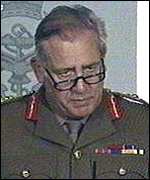 |
| General Charles Guthrie |
General Charles Guthrie, chief of UK defence staff, told a news conference late last month that there was a "continuous two-way flow of military and defence industry delegations, discussing primarily Iraqi military requirements." Cooperation and intelligence sharing between Iraqi and Yugoslav forces began in earnest during the months leading up to the recent NATO airstrikes. "The attraction in this relationship generally is that both have similar military systems and very compatible equipment, and they face the same kind of air threat from the West," said a senior Clinton administration official.
In early March, an 18-member delegation of Yugoslav military experts led by Deputy Defence Minister Jovan Djukovic visited Iraq and toured a number of military facilities. The visit followed an earlier trip by Ivan Ivanovich, a Yugoslav chemical and biological weapons expert on March 9.
Yugoslav officials have reportedly agreed to supply the Iraq with advanced SA-7 anti-aircraft missile systems built in Yugoslavia. Thus far, Iraq has had to rely upon older and less effective SA-2 and SA-3 Soviet missile systems in challenging American and British air superiority in the no-fly zones in northern and southern Iraq. Iraq has also conducted a moderate amount of commerce with Yugoslavia under the United Nations oil-for-food program, primarily wheat and medicine imports.
Meanwhile, the Iraqis have reportedly agreed to assist the Yugoslavs in combating the ongoing NATO air strikes that began last month. Iraqi officials have briefed the Yugoslavs on various tactics they've employed during the last eight years of conflict with the U.S. and British airforces. "We have seen some of these Iraqi tactics put into place over Serbia," said Gen. Guthrie, such as transfering antiaircraft batteries into civilian areas that NATO is reluctant to target. Other Iraqi tactics, such as planting decoys and learning the timing of the satellite imaging to foil U.S. surveillance efforts, are presumably being used by the Yugoslavs as well.
Cooperation between Belgrade and Baghdad dates back to the 1970s, when Yugoslavia helped construct bunkers for the Iraqi army. During the 1980s, Yugoslavia was a primary supplier of air-defense weaponry to Iraq and assisted in the construction of Iraqi airfields and underground command centers.
Division in Israel
Reactions to the Kosovo crisis among Israeli policymakers have been sharply divided. Prime Minister Benjamin Netanyahu expressed his "full support for NATO's goal of bringing an end to the tragedy in the Balkans" and, citing Israel's special concern for victims of attempted genicide, promptly sent $100,000 worth of medical supplies and clothing to refugee camps in Macedonia and Albania.
However, Foreign Minister Ariel Sharon has staunchly refused to either endorse NATO's involvement in Kosovo or condemn the Yugoslav government. According to Sharon, the NATO intervention in Kosovo also sets a dangerous precedent for future foreign intervention on behalf of disaffected Palestinians. "The moment Israel will express support for the sort of action in Kosovo, it could be the next victim," said Sharon in an interview with the Israeli newspaper Yediot Ahronot earlier this month.
Sharon's sentiments, shared by many in Israel, are partially inflamed by public statements from the Palestinian National Authority (PNA). "The war in Yugoslavia is a sign of a new development in international relations by which the international community uses force to impose international agreements," said Ahmed Abdel Rahman, secretary of the PNA cabinet, at a recent press conference. "We will ask the international community to intervene to end the Israeli occupation of Palestinian land and to expel the settlers from it."
After Kosovo, West should move to free Palestinians: official Wed, 14 Apr 1999Sharon also insists that the NATO campaign will backfire by strengthening the KLA and its radical Islamic allies. "The free world must look forward and see dangers in the future if a large bloc of Islamic states should develop what it's possible to call a Greater Albania. In my opinion this can lead to unrest in Europe."
Syria Objects to NATO Assault
While Syrian officials have been tight-lipped with regard to the Kosovo issue, the various media organs of the regime have sharply criticized NATO. The NATO strategy "lacks clarity of aim, seriousness of approach and definition of goals," said the official English-language daily Syria Times. "It should surprise no one that this huge NATO military operation could last weeks--if not months --without forcing Belgrade to yield or find a balanced solution to the crisis." It added that "the fighting has brought new suffering to the Albanians in Kosovo, damaged the country and complicated the international efforts to balance competing interests in a strategically sensitive region."
Lebanon Undecided
Lebanon, not surpisingly, has no clear position on the crisis in Kosovo. Lebanese Prime Minister Selim Hoss was quoted as saying "Lebanon will abide by the Arab consensus" on the issue. Since no real consensus among Arab states is likely to emerge, Lebanon will presumably remain undecided for quite some time.
U.S. officials who recently returned from a visit to Damascus have said that the Syrian economy is in "a state of collapse" with little hope of improvement. "Deterioration is evident everywhere," said one congressman after his return from this country. "When I went from Syria to Jordan, I felt like I was going from Nigeria to Switzerland."
Syria's economic outlook was relatively good throughout most of this decade due to a series of economic reforms implemented by the regime of Hafez Assad. Indeed, the pace of liberalization in Syria led some analysts to conclude that the development of a market-driven economic order in Syria was "irreversible."1
However, according to reports prepared by Undersecretary of State for Near East Affairs Martin Indyk after his recent visit, the Syrian economy has declined sharply since the mid-1990's. A shortfall in foreign investment and lack of growth in exports have generated a severe economic slowdown in agriculture, commerce and construction. In addition, three principle sources of hard currency earnings--tourism revenue, remittances from Syrian workers overseas, and oil sales have sharply declined. Consequentially, Syria's GDP slipped 4.4 % percent in 1997. Per capita GDP, which had risen to a high of $1,050 in 1995, fell to less than $900. Analysts say that the situation will probably continue to deteriorate. Syria's GDP is expected to decline another 2-4% in 1999. The regional drought this year will sharply reduce harvests--about 99% of Syrian agriculture is dependent on winter rains, which were far below average.
Such economic figures are dismal by any standard. In Syria's political economy, however, they threaten to be a source of immense instability if not rectified. Syria's population continues to grow at 3.3% annually. Like many other developing countries, its population is very young--56% of Syrians are under the age of 16. This means that Syrian economy must generate 140,000-200,000 new jobs per year in order to accomodate this wave of youth into the labor market.
U.S. officials privately maintain that the real problem responsible for Syria's economic misfortunes is the larger political crisis in Damascus. The veil of uncertainty concerning Assad's successor is not conducive to investor confidence. Moreover, the Syrian regime appears to be preoccupied with "cautious political calculations" over this future transition and has largely abandoned market reforms.
1 Hans Hopfinger and Marc Boeckler, "Step by Step to an Open Economic System: Syria Sets Course for Liberalization," British Journal of Middle Eastern Studies, November 1996Israel, which has one of the most high-tech militaries in the world, is taking the Y2K bug very seriously.
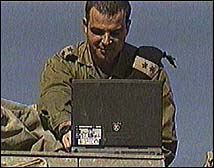 |
| These days, even tank commanders rely upon laptop computers |
The modern weapons and communications systems which give the Israeli Defense Forces (IDF) a qualitative edge over the militaries of neighboring states are highly dependent upon computer technology. Every unit of the IDF relies either directly or indirectly on computers. Israeli field commanders, for example, track the movements of enemy troops (an their own) with the help of computerized global positioning satellites (GPS).
The threat that the Y2K bug poses to IDF military readiness is therefore taken very seriously. The Y2K computer bug, which causes older computer systems (which record dates using the last two digits of the year) to treat the year 2000 as the year 1900, could generate errors or system crashes in IDF computers systems when the new millenium begins on January 1.
"The Israeli army is a very, very high-tech army, so the problem is there and we have to deal with it," said Lt. Col. Dror Margalite. "If we weren't so high-tech, I believe the problem would be a minor problem." In fact, it is even possible that neighboring states could gain a temporary advantage over the IDF when the year 2000 first arrives because their military forces are far less dependent upon computer technology.
Defense planners have been working on the Y2K problem since 1996 and are still in the process of computer testing. Experts say that some computer systems could malfunction this summer, when computer code will be replaced in airplanes, missiles and tanks to avert a GPS system breakdown, which could occur as early as mid-August.
In addition to fixing its own computer systems, the IDF is also taking steps to ensure its readiness in the event of a nationwide Y2K crisis on January 1. "The problem is not whether or not the army will be ready for the year 2000, but rather what will happen if there's no electricity or water," said IDF computerization division head Brigadier Nissim Alafia last summer. "We are organizing ourselves for full independence from the national infrastructures: we have systems to ensure electricity supply in the event of breakdowns, there will be generators, [and] we'll organise fuel tanks next to the generators."
The risk of nationwide power disruptions or other major Y2K-related infrastructural problems in Israel is believed to be minimal. According to a report prepared last year by the Gartner Group research company, Israel ranks fifth among countries most prepared for the Y2K problem. However, "isolated and secondary" glitches in power supply and telephone communications are expected.
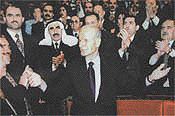 |
| Hafez Assad's inauguration |
An article appearing in the Syrian newspaper al-'Arab, last month stated that Damascus is taking steps "to create a Greater Syrian Front and using that as a linchpin for reviving Arab Solidarity." According to the article, "Syria has the inherent strength, an important strategic position and an effective political role that, under reasonably favorable conditions, will enable it to act as a cantilever for building up Arab power." The article adds that Syrian President Hafez Assad's unexpected appearance at the funeral of the late King Hussein of Jordan and subsequent discussions with King Abdullah were intended to coaxe Jordan into the fold.1
Such sentiments are not, of course, particularly unusual in the Syrian press. What is highly unusual is that these sentiments are now being echoed in the Jordanian press. The Jordanian weekly al-Majd explicitly expressed its support of Greater Syria in an editorial published earlier this month. The editors called for reviving the "Greater Syria" project within the framework of a confederation comprised of Syria, Jordan, and Lebanon, to be joined later by a Palestinian state. Such a confederation, they argued, would strengthen Jordan's water, economic and security conditions. The paper expressed great hope that King Abdullah's upcoming visit to Damascus, where he will meet with Syrian President Hafez Assad, will be productive in laying the groundwork.2
The Jordanian daily al-Dustour has called for closer Arab integration and expressed hope that "a revision in inter-Arab relations will be made very soon without our being obliged to wait for the death of a generation of leaders and the coming of a new generation instead."3
"Jordan is being exposed to great pressures from the Israeli side in order to isolate it away from getting mingled in the Arab issues," said the Jordanian weekly al-Hadath, last month. "The task of Syria and the Arab states . . . is to contain these Israeli pressures and restore Jordan to carrying out its earlier role within the context of its Arab orbit."4
Even Jordanian Prime Minister Abdul Raouf al-Rawabdeh declared himself an "advocate of strategic integration [with Syria] in all political fields and on various economic levels" in an interview with al-Majd last month.5
Anatomy of the Syrian Strategy
How did Syria managed to score such an impressive victory over a strong American ally?
The extended illness and subsequent death of King Hussein removed from the Jordanian political scene a stalwart opponent of Syrian influence in the Kingdom. Syria took advantage of King Hussein's extended departure from Jordan for medical treatment in the United States last year by stepping up pressure on the kingdom. Numerous Jordanian citizens were detained by Syrian security forces, bringing the total to over 700. In retaliation, Jordan began to allow the Amman-based Committee of Families of Jordanian Detainees in Syria, headed by lawyer Imad Sherqawi, to undertake highly publicized activities, including a sit-in before the Jordanian Parliament. Syrian-Jordanian relations hit a low point in October when the Syrian press reported an allegation by Syrian Defense Minister Lt. Gen. Mustafa Tlass that the Jordanians "prevented the arrival of the Saudi troops to the battlefield in the Syrian Golan during the October War in 1973."
"We are one hundred percent concerned with the file King Hussein delivered to President al-Assad during the recent Cairo Arab summit conference in 1996 concerning terrorism which Syria is accused of practicing against Jordan," said Prime Minister Fayez Tarawneh in a November 1998 interview.6 Tarawneh pointed out that Syrian animosity toward Jordan was not a recent development in response to Jordan's peace treaty with Israel. "As a prime minister I am bewildered over the matter which is viewed by the Syrians as the main reason of the crisis with Jordan. But we are not convinced that the peace agreement with Israel is the reason." He added that the Syrians refused to appoint an ambassador to Jordan after the position was left open at the beginning of 1993, one and a half years prior to the signing of the Jordanian- Israeli agreement.
When King Hussein died in February, Syrian President Hafez Assad unexpectedly attended the funeral and soon opened a dialogue with his successor, Abdallah. Bashar Assad, his son and heir apparent, made a followup visit to Amman shortly afterwards. Statements to the press by King Abdallah indicate that a new policy toward Syria has been undertaken by his government.
At the moment, the Syrian-Jordanian entente is manifest primarily in the economic sphere. Sources say that the activity of the joint higher committee chaired by the two states' prime ministers (which has been suspended since 1990), will likely be revived in order to study prospects of water and economic cooperation. The al-Wahdah dam agreement on investing the waters of al-Yarmouk river is also back on the table and progress has been made in establishing joint economic ventures, such as the Jordanian-Syrian free trade zone in Daraa, the Syrian-Jordanian company for land transport, and several factories held jointly between the two states.
1 Al-'Arab, 4 March 1999.10 March 1999 An Iraqi diplomat based in India defected to the United States, according to The Hindustan Times. The Iraqi embassy confirmed only that the whereabouts of Mohammad al-Daini, who had been stationed in India for two years, are unknown.
19 March 1999 The General Secretariat of the Democratric Revolutionary Arab Dialogue of Marxist, Islamic and National Parties wrapped up a major conference in Damascus. A statement released after the meeting confirmed its commitment to the "Arab identity of Palestine" and called for backing "Arab national issues" in Lebanon.
19 March 1999 Iraqi opposition forces reportedly carried out two attacks against the Iraqi army--the first near the town of Amara and the second near Basra. According to a representative of the London-based Supreme Council for Islamic Revolution in Iraq (SCIRI), several tanks were destroyed in the first attack.
20 March 1999 A senior Ethiopian official accused Libya of supplying MIG-29 fighter planes to Eritrea. Ethiopia and Eritrea have been embroiled in a war over their disputed border since February 6.
22 March 1999 The New York Times quotes an unnamed senior Saudi official as saying that Saudi Arabia has refused to permit attacks against Iraq by American warplanes based in the Kingdom. "Whatever has to do with hitting targets in Iraq will not have the support of the kingdom," said the official.
23 March 1999 A report published in the London-based Al-Sharq al-Awsat quotes senior Iraqi Baath Party officials as saying that Qusai, the second son of Iraqi President Saddam Hussein, will soon be appointed second-in-command to his father. The exact title of this position was not specified.
� 1999 United States Committee For A Free Lebanon. All rights reserved.